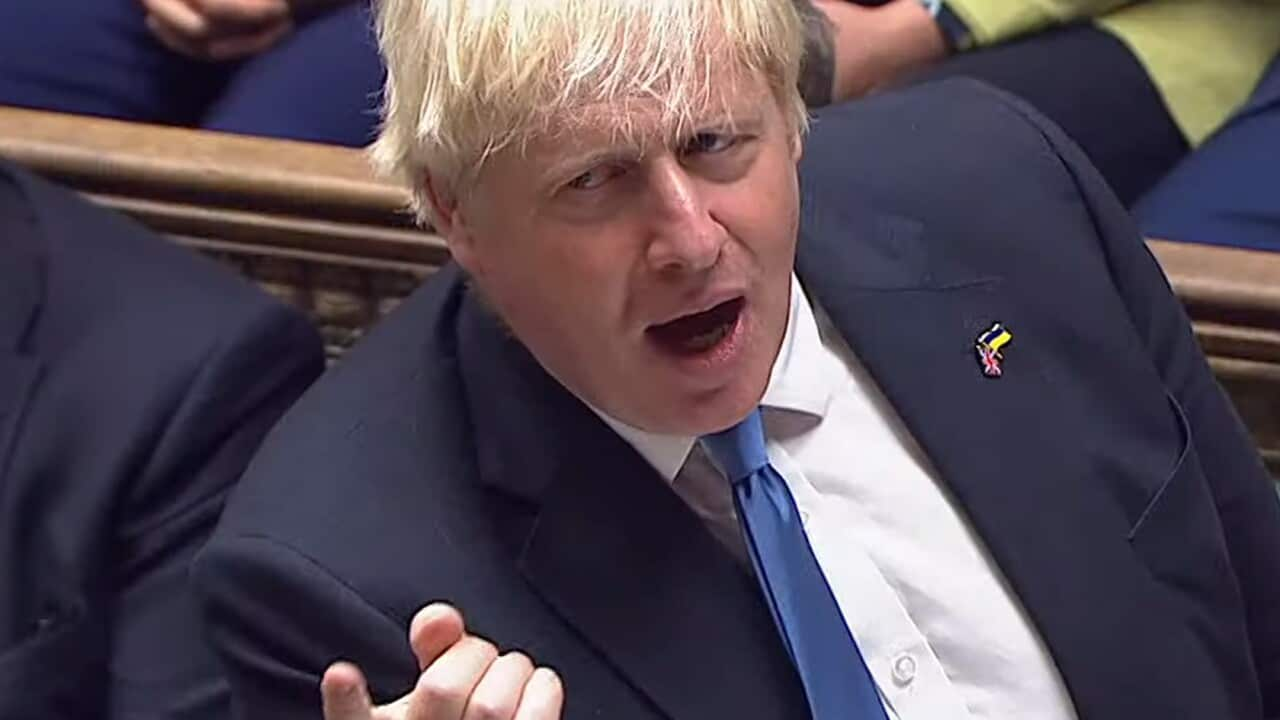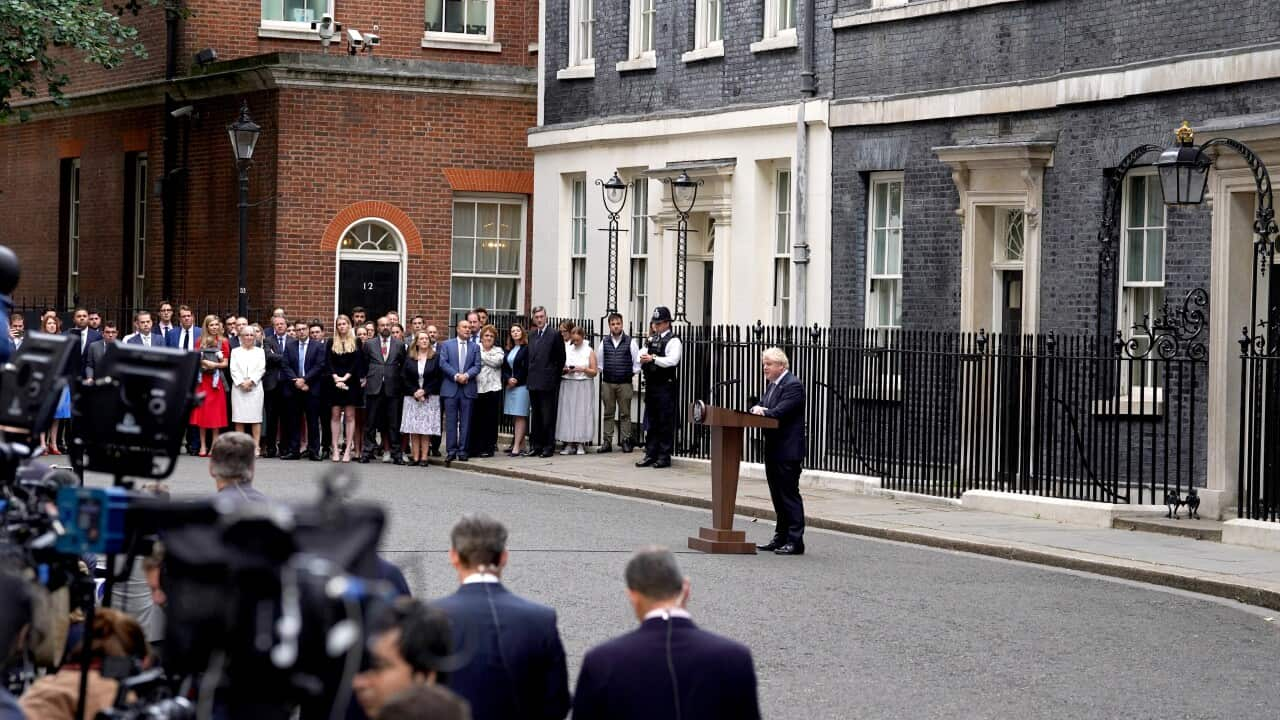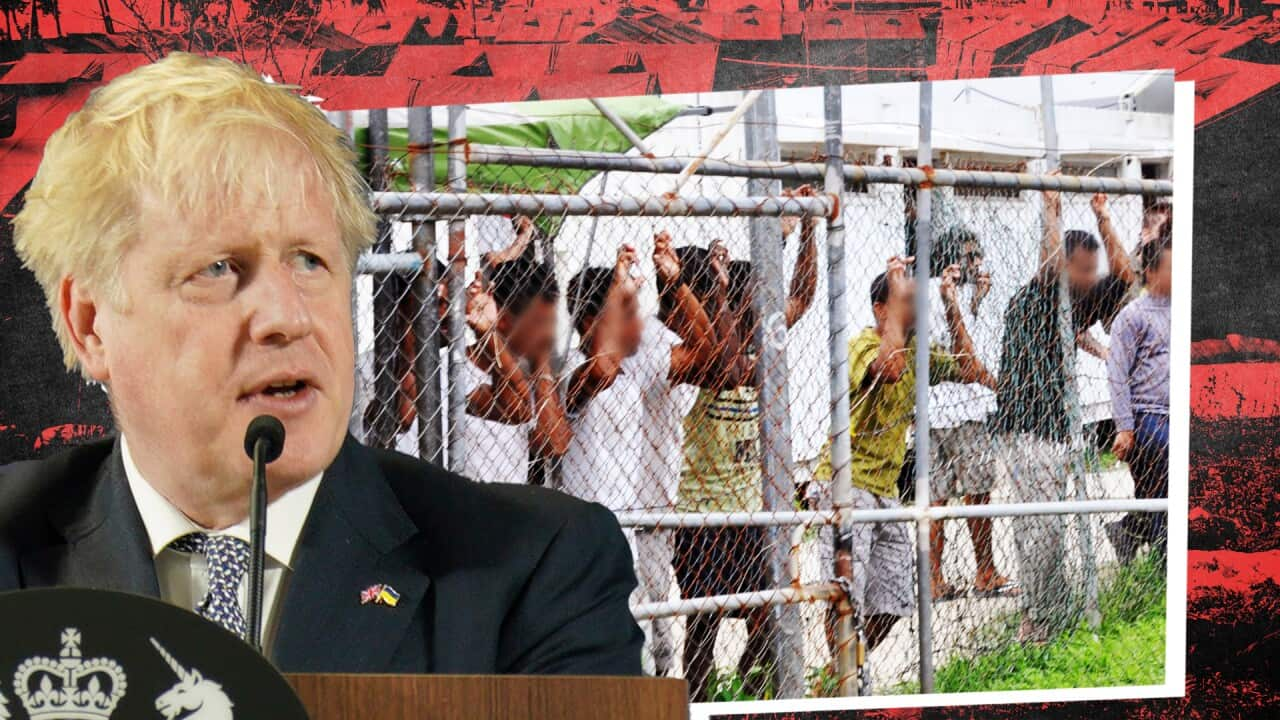Key Points
- Mr Johnson defended his three tumultuous years in office as he bowed out during Prime Minister's Questions.
- It comes as Conservative MPs held a concluding vote on candidates for the leadership race.
To a standing ovation from his recently mutinous MPs, United Kingdom Prime Minister Boris Johnson bowed out of his final set piece event in parliament Wednesday, signing off by saying: "Hasta la vista, baby!"
With a vintage blast of invective against his critics, Mr Johnson defended his three tumultuous years in office — from Brexit and COVID-19 vaccines to Ukraine — and praised the candidates battling to succeed him, while fending off opposition attacks at his last session of Prime Minister's Questions.
The House of Commons breaks for its summer recess on Thursday, and the new leader is set to be announced when it reconvenes on 5 September.
Former finance minister Rishi Sunak and Foreign Secretary Truss emerged as the final two candidates vying for the Conservative Party leadership after the party's MPs held a concluding vote.
Mr Johnson's Downing Street operation is reportedly running an "anyone but Rishi" campaign, accusing the former finance minister of having orchestrated the cabinet revolt that brought him down this month after many scandals including "Partygate".
"I'm not following this thing particularly closely," the prime minister said of the Tory race, to laughter.
Mr Johnson, 58, reprised his long-running characterisation of Labour leader Keir Starmer as "Captain Hindsight" over COVID-19, and called him "a great pointless human bollard" standing in the way of progress for the UK.
Mr Sunak and Ms Truss, the last two standing in the leadership race, now take their case to Conservative party members, who will decide the new leader and prime minister after a dozen nationwide hustings and several televised debates over the next six weeks.
Mr Johnson urged the contenders to "stay close to the Americans, stick up for the Ukrainians, stick up for freedom and democracy everywhere".
"Cut taxes and deregulate where you can to make this the greatest place to live and invest... focus on the road ahead but always remember to check the rearview mirror.
"And remember above all it's not Twitter that counts, it's the people that sent us here.
The result will be announced on 5 September. But the UK is already guaranteed to get either its first prime minister of colour or its third woman leader.
The economy will be a key battleground in the coming weeks. But they also have differing views on other policy areas.

Liz Truss and Rishi Sunak will vie for the UK Conservative Party's leadership over the coming weeks. Source: Press Association / PA/PA Source: Press Association / PA/PA
Taxation
Former finance minister Mr Sunak is vowing to stick with a host of recent tax rises in a bid to balance the books following record government borrowing during the COVID-19 pandemic.
He has said curbing inflation, which is at a 40-year high, is his priority and criticised Ms Truss's "fairytale" plans on tax.
Foreign Secretary Truss has accused Mr Sunak of pulling the UK to the brink of recession, and vowed to "start cutting taxes from day one" including corporation tax paid by businesses.
She also wants to review the Bank of England's mandate to set interest rates.
Cost of living
As chancellor of the exchequer, Mr Sunak in May implemented a £15 billion (A$26 billion) package of support to help Britons through the worst cost-of-living crisis in decades.
However, his leadership rivals criticised it as insufficient, with energy prices set to surge anew in October.
Ms Truss has vowed to use economic growth fuelled by her promised tax cuts as the primary way to tackle the crisis.
Brexit
Ms Truss backed remaining in the European Union in Britain's 2016 referendum, before becoming a zealous convert to the Brexit cause. Since December, she has led negotiations with Brussels over subsequent frictions.
She is pushing new legislation that would unilaterally rewrite the UK's post-Brexit commitments to the EU over Northern Ireland, which opponents say breaches international law.
Mr Sunak, a rising Tory star in 2016, came out early for Brexit, to the despair of then leader David Cameron.
He has said he backs the controversial proposals on the "Northern Ireland Protocol" and, as chancellor, promoted "freeports" around Britain as one way of profiting from Brexit.
Immigration
Under pressure to curb waves of migrants crossing the Channel from France, the Conservative government has been pushing .
The policy, which has been stalled by legal action, is backed by both candidates. Ms Truss has called it "completely moral".
But Mr Sunak has faced anonymous briefings to newspapers claiming he opposed it in cabinet over its £120 million (A$208 million) costs.
Defence
Mr Sunak has declined to set "arbitrary targets" on military spending following the war in Ukraine.
But he views NATO's target — for member states to spend 2.0 per cent of GDP on defence — as a "floor and not a ceiling".
He wants Britain's defence budget to rise to 2.5 per cent of GDP "over time". Ms Truss has been more forthright, this week committing to spending 3.0 per cent by 2030.
Climate
Mr Sunak has vowed to stick with the UK's legally binding targets to reduce carbon emissions to net zero by 2050.
He would maintain "green levies" on energy bills earmarked to help the renewable sector grow.
Ms Truss has vowed to scrap the levies, but says she is committed to the 2050 target.












